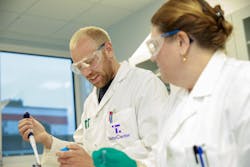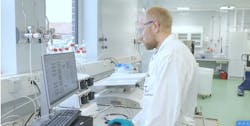Testa Center Automates Pharmaceutical Innovation
In 2018, an initiative between the Swedish government and Cytiva (a global life sciences company, formerly GE Healthcare Services), led to the creation of The Testa Center to support the growth of the life sciences industry and its manufacturing capabilities. More specifically, the center is focused on creating an agile automation framework for the faster, more precise and more efficient development of personalized treatments, says Jesper Hedberg, CEO at the Testa Center.
A key aspect of the Testa Center’s work centers on technologies from Rockwell Automation to deliver a standardized manufacturing platform capable of supporting the life science industry’s data management requirements.
The purpose of the Testa Center, according to Hedberg, is to make it possible for small research groups and small companies to verify their innovations. “We're a non-profit organization that provides a production-like environment for test runs of products and procedures,” he says.
“The future of medicine is combining new technologies and innovations into more precision treatment,” adds Lotta Ljungqvist, former CEO of the Testa Center. “That's something we call precision medicine or personalized medicine—you can get treated without side effects and also more efficiently and quicker.”
Platform components
At the Testa Center, all process equipment is managed by Cytiva’s Figurate automation platform, which, along with Rockwell Automation’s PlantPAx DCS (distributed control system), includes control, data acquisition and storage, centralized user management, human-machine interface (HMI), recipe creation and execution, cybersecurity, alarms and events, and report generation. The Rockwell-controlled portions of the platform are integrated under the FactoryTalk View software HMI. Cytiva’s Unicorn software provides unit-level control for its Äkta chromatography and Wave 25 bioreactor systems. According to Cytiva, its Unicorn software is designed for use on a network so that methods and data can be shared between all users and systems.
Cullen noted that Cytiva and Rockwell are collaborating to create PlantPAx software libraries for Cytiva’s upstream and downstream bioprocessing equipment based on Rockwell standards.
Industry applications
Another facet of this collaboration between Rockwell Automation and Cytiva is the creation of an Automation and Digital Transformation Center in Shanghai, China. This center focuses on exploring application of the Industrial Internet of Things and augmented reality across pharmaceutical manufacturing processes.
David Rubin, commercial and business director at Cytiva, adds that Cytiva, in conjunction with Rockwell, has supplied multiple unit operations to a Chinese biomanufacturer to integrate with its PlantPAx DCS. “We’ve also supplied multiple PlantPAx controlled unit operations to a U.S. West Coast biotech company focused on cell and gene therapies. Both these companies selected the solution as it offers rapid, pre-tested, pre-verified functionality which has the robust, scalable functionality enabling the users to reduce paper, facilitate investigations and enable faster changeovers while maintaining safety and regulatory compliance.”
About the Author
David Greenfield, editor in chief
Editor in Chief

Leaders relevant to this article:



